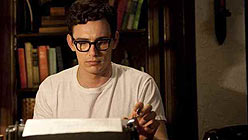In an interview with Playboy magazine — see, people do read it for the articles — Allen Ginsberg was asked about his struggles to accept his homosexuality. His answer, recreated in the unconventional and illuminating biopic Howl, cuts to the heart of what his poems (and this movie) seek to express.
“The poems get misinterpreted as promotion of homosexuality,” said Ginsberg. “Actually, it’s more like promotion of frankness, about any subject.” He continues, “When a few people get frank about homosexuality, it breaks the ice. Then anybody can be frank about anything. It’s socially useful.”
Written and directed by Rob Epstein and Jeffrey Friedman, making their feature debut after several superb gay-themed documentaries including The Celluloid Closet and The Times of Harvey Milk, Howl takes a prismatic look at Ginsberg’s seminal 1955 poem and the controversy surrounding it. But while it celebrates the poem and sketches the barest outlines of Ginsberg’s life, the film posits the obscenity trial that followed the publication of Howl and Other Poems as central to its legacy. It ultimately makes a case for Howl as a gift to public discourse — for opening frank, honest, and, yes, uncomfortable discussions about sexuality, free speech and what constitutes artistic value.
In the style of the best biopics, Epstein and Friedman don’t try to explain the mysteries of Ginsberg through a birth-to-death chronicle of major events in his life, approaching him from a few illuminating angles. Howl follows three different threads: An interview with Ginsberg that naturally segues into vignettes on his early life and loves and his development as a writer and poet; animated sequences that attempt to visualize the poem’s wild stream of consciousness; and scenes from the obscenity trial of publisher Lawrence Ferlinghetti. The three combine in a seamless consideration of the poem’s personal and social resonance, and shows the complex relationship between a work of art and people left to interpret it.
James Franco looks nothing like Allen Ginsberg — the horn-rimmed glasses do a lot of the heavy-lifting — but he makes sense of the casting by losing himself in the role. It would be tempting for any actor to overplay a character as rebellious and emphatic as Ginsberg was on the page, but Franco’s taciturn performance speaks to the real difficulties the poet had in expressing himself fully. That “frankness” he talks about requires courage and a lack of inhibition, and Franco respects Ginsberg’s reserve and resists the urge to do an actorly performance. (And based on the one audio snippet we hear of the real Ginsberg, he gets the poet’s odd speech rhythms precisely right.)


